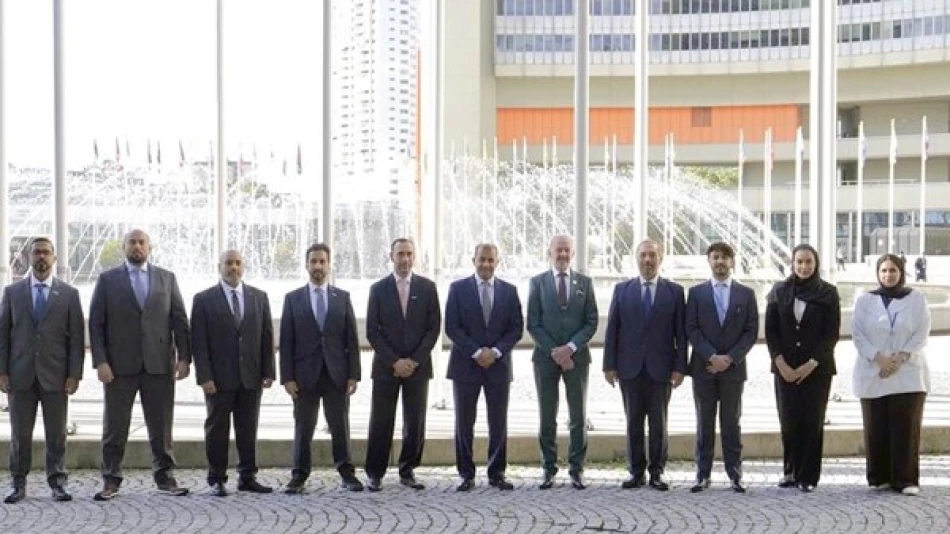
UAE Participates in 69th IAEA Conference, Advancing Nuclear Energy Solutions in Vienna
UAE Positions Itself as Nuclear Innovation Hub at Vienna Conference
The United Arab Emirates is leveraging the 69th International Atomic Energy Agency General Conference in Vienna to showcase its expanding nuclear ambitions beyond the operational Barakah plant. With plans for small modular reactors and advanced nuclear technologies, the Gulf nation is positioning itself as a regional leader in peaceful nuclear development while strengthening international regulatory partnerships.
Strategic Nuclear Expansion Beyond Barakah
UAE Ambassador Hamad Al Kaabi, the country's permanent representative to the IAEA, outlined the nation's nuclear roadmap during the September 15-19 conference. The delegation, comprising officials from the Federal Authority for Nuclear Regulation and the Emirates Nuclear Energy Corporation, emphasized the country's shift from nuclear newcomer to innovation pioneer.
The announcement of programs to evaluate small modular reactors (SMRs) signals the UAE's intent to diversify its nuclear portfolio beyond the four-unit Barakah plant, which has become a cornerstone of the country's energy infrastructure. This move aligns with global trends toward more flexible, scalable nuclear solutions that can integrate with renewable energy systems.
Small Modular Reactors: The Next Frontier
The UAE's interest in SMRs reflects a broader global shift in nuclear strategy. Unlike traditional large-scale reactors, SMRs offer enhanced safety features, reduced capital requirements, and faster deployment timelines. For a country like the UAE, which has successfully demonstrated nuclear project management capabilities with Barakah, SMRs represent a logical next step in expanding clean energy capacity while maintaining grid flexibility.
Regulatory Diplomacy and International Partnerships
The Vienna conference serves as more than a policy forum for the UAE—it's a platform for regulatory diplomacy. The Federal Authority for Nuclear Regulation plans to sign multiple agreements with international regulatory bodies covering research and development, information sharing, nuclear safety, and radiation protection.
This approach mirrors successful nuclear programs in countries like South Korea and France, where robust international partnerships have accelerated domestic capabilities while maintaining the highest safety standards. The UAE's emphasis on regulatory cooperation positions it as a responsible nuclear actor, crucial for future technology transfers and joint ventures.
Regional Nuclear Leadership
The UAE's nuclear diplomacy extends beyond bilateral agreements. By participating in senior nuclear safety and security meetings, the country is establishing itself as a regional voice in global nuclear governance. This positioning could prove valuable as other Gulf states, including Saudi Arabia, explore their own nuclear programs.
Market Implications and Investment Opportunities
The UAE's nuclear expansion plans carry significant implications for the global nuclear industry. As one of the few countries to successfully complete a new nuclear program in recent decades, the UAE's endorsement of SMR technology could accelerate international development and deployment of these systems.
For nuclear technology vendors, the UAE represents both a potential customer and a testing ground for advanced reactor designs in challenging climatic conditions. The country's financial resources, regulatory maturity, and strategic location make it an attractive partner for companies developing next-generation nuclear technologies.
Decarbonization Strategy in a Hydrocarbon Economy
The nuclear expansion fits within the UAE's broader energy transition strategy, which aims to balance economic diversification with climate commitments. Unlike countries that view nuclear as a bridge technology, the UAE appears to position it as a long-term pillar alongside renewables and hydrogen production.
This integrated approach to decarbonization—combining nuclear baseload power with solar capacity and emerging technologies—could serve as a model for other resource-rich nations seeking to maintain energy security while reducing carbon emissions. The success of this strategy will likely influence nuclear policy decisions across the Middle East and beyond.
Most Viewed News

 Layla Al Mansoori
Layla Al Mansoori






